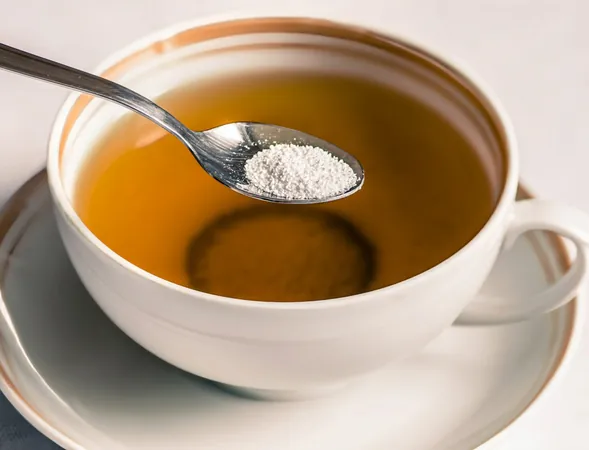
Unbelievable Discovery: Common Sweetener Saccharin Could Combat Deadly Bacteria!
2025-04-07
Author: Ming
Unbelievable Discovery: Common Sweetener Saccharin Could Combat Deadly Bacteria!
In a groundbreaking study, researchers have revealed that saccharin, an artificial sweetener commonly found in diet products, might have an unexpected role in modern medicine: fighting some of the deadliest bacteria known to mankind.
Professor Ronan McCarthy, who spearheaded the study at Brunel University London, shed light on the pressing issue of antibiotic resistance, which poses a significant threat to global health. "Antibiotic resistance is one of the major threats to modern medicine," he emphasized, explaining that common procedures, from tooth extractions to cancer treatments, heavily depend on antibiotics. However, as these bacterial foes evolve, many antibiotics are becoming ineffectual.
A Look at the Threats: The Rise of Deadly Pathogens
According to the World Health Organization, antimicrobial resistance (AMR) claimed a staggering 1.27 million lives in 2019 alone, with nearly five million deaths linked to resistant infections. Among the most concerning culprits are two notorious bacteria: Acinetobacter baumannii and Pseudomonas aeruginosa. These pathogens are prevalent in hospital environments and often target individuals with compromised immune systems.
How Saccharin Works Its Magic
In an exciting revelation, the study unveils how saccharin operates at a cellular level. Professor McCarthy highlights that saccharin physically disrupts bacterial cell walls, causing them to distort and ultimately burst, effectively eliminating these harmful bacteria. This interesting mechanism also enhances the effectiveness of traditional antibiotics by allowing them better access to the bacteria.
Previously regarded primarily as a sweetener—having been used safely for over a century—the new findings showcase saccharin's potential to contribute meaningfully to antibacterial therapies.
Chaos Within Bacterial Cells: The Unraveling of DNA
The research further demonstrates that saccharin disrupts not just the structural integrity of bacterial walls but also affects their DNA. Researchers observed treated bacteria elongating and becoming incapable of division, with DNA replication spiraling out of control. This disruption suggests that saccharin triggers faulty DNA repair mechanisms, leading to rampant replication errors.
Weakening Bacterial Defense Systems
The findings indicate that saccharin interferes with the proteins involved in maintaining the structural integrity of bacterial envelopes. Bacteria subjected to saccharin treatment showcased noticeable distortions, forming abnormal bulges that eventually burst, similar to the effects of certain potent antibiotics like β-lactams.
Moreover, this sweetener significantly impedes the formation of biofilms—protective layers that bacteria create to shield themselves from antibiotic attacks—allowing for more effective treatments against stubborn infections, including those caused by polymicrobial strains.
Real-World Applications: Healing Wounds
In practical applications, researchers have embedded saccharin into hydrogels, which were then tested on burn wounds in a laboratory setting. Impressively, the saccharin-enriched hydrogels outperformed traditional silver-based dressings, drastically reducing bacterial infections.
“Artificial sweeteners, commonly found in many foods, could revolutionize our approach to treating some of the world’s most dangerous bacteria,” stated Professor McCarthy.
The Urgent Need to Address Antibiotic Resistance
As we navigate the growing threat of antibiotic resistance, the urgency for new solutions grows. Over-reliance on antibiotics in healthcare and agriculture has led to a scenario where bacteria become increasingly resilient, making routine infections potentially lethal.
Professor McCarthy urges the scientific community to explore new therapeutic avenues: "We urgently need new drugs to treat resistant infections—saccharin could represent an innovative approach with enormous potential."
This eye-opening research is set to be published in the journal *EMBO Molecular Medicine*, marking a significant step forward in the fight against antibiotic resistance. As we face an uncertain future in which common infections could once again pose lethal risks, the scientific community looks toward innovative strategies like saccharin to combat this growing threat.
Stay tuned for more updates on this exciting development in medical research!
 Brasil (PT)
Brasil (PT)
 Canada (EN)
Canada (EN)
 Chile (ES)
Chile (ES)
 Česko (CS)
Česko (CS)
 대한민국 (KO)
대한민국 (KO)
 España (ES)
España (ES)
 France (FR)
France (FR)
 Hong Kong (EN)
Hong Kong (EN)
 Italia (IT)
Italia (IT)
 日本 (JA)
日本 (JA)
 Magyarország (HU)
Magyarország (HU)
 Norge (NO)
Norge (NO)
 Polska (PL)
Polska (PL)
 Schweiz (DE)
Schweiz (DE)
 Singapore (EN)
Singapore (EN)
 Sverige (SV)
Sverige (SV)
 Suomi (FI)
Suomi (FI)
 Türkiye (TR)
Türkiye (TR)
 الإمارات العربية المتحدة (AR)
الإمارات العربية المتحدة (AR)